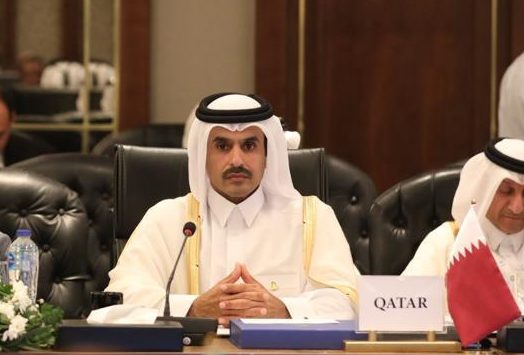The latest ministerial meeting also came under a gloomy climate in the global energy market, with European countries scrambling to secure their supplies.
Egypt’s President Abdelfattah El Sisi met with Qatar’s minister of state for energy affairs along with other officials in Cairo for the ministerial meeting of the Gas Exporting Countries Forum (GECF).
Qatar’s energy minister, Saad Al-Kaabi represented the Gulf state at the meeting, in which officials discussed cleaner energy alternatives as well as the latest global energy crisis.
Other ministers from GECF member states included Algeria, Bolivia, Egypt, Equatorial Guinea, Iran, Russia, Trinidad and Tobago and Venezuela.
Al-Kaabi had already met with his Russian counterpart Nikolay Shulginov in Cairo on the same day where they discussed bilateral relations in the energy field.
The meeting appointed Al-Kaabi as the GECF’s alternate president for 2023’s ministerial meeting.
Speaking at the meeting, Egypt’s Minister of Petroleum and Natural Resources Tarek El Molla said that Cairo is currently working to ensure the adoption of “realistic initiatives” in light of the alarming threats of climate change.
Cairo is also set to host the 2022 United Nations Climate Change Conference (COP27) next month.
“As the cleanest hydrocarbon fuel, natural gas is seen as the perfect solution that strikes the right balance, and will continue to play a key role in the future energy mix,” said the Egyptian minister.
Qatar has already been working on leading the energy transition to a low carbon source, such as liquified natural gas (LNG). This is mainly through its multibillion-dollar North Field expansion project, the biggest of its kind in the world.
The project is expected to increase Qatar’s LNG production capacity to 126 million tonnes per annum by 2027.
Geopolitical challenges
The latest ministerial meeting comes amid a bleak climate in the global energy market, with European countries scrambling to secure supplies as the war in Ukraine continues.
“We are convening at a critical time when global efforts are dedicated towards achieving the energy trilemma for security, sustainability and affordability,” said El Molla.
Europe was particularly hit by the crisis in Ukraine, given its heavy reliance on Russian gas.
The region previously received 40% of its gas supplies from Moscow and almost a third of the shipments pass through Ukraine. However, supplies dropped amid sanctions against Russia following its invasion of Ukraine.
As a LNG giant, Qatar was approached by European countries in bid to ditch reliance on Russian gas. Some of those countries include Germany, Italy, and Austria.
Speaking in Cairo on Monday, Al-Kaabi stressed that oil and gas trade should be “depoliticised”, urging governments to avoid “anti-free market agreements”.
“The State of Qatar and QatarEnergy urge all governments and multilateral institutions to craft policies which depoliticize the exchange of fuel commodities in the form of sanctions or anti-free market agreements,” said Al-Kaabi.
Last month, the Group of Seven (G7) agreed to place a price cap on Russian oil sales by 5 December, warning importers that paying above the capped price will not be covered by western insurers.
The G7 comprises the United States, United Kingdom, Italy, France, Germany, Canada, and Japan.
On Tuesday, Al-Kaabi further expressed concern over the latest disruptions in energy supplies.
Meanwhile, the GECF members warned that “the escalating geopolitical tensions coupled with the economic restrictions imposed on some countries have made the prospects even more uncertain.”
“Market tightness is expected to continue in the medium-term, as the majority of new projects will come on stream only after 2025,” read a statement by the GECF.
Speaking to the Shura Council on Tuesday, Qatar’s Amir Sheikh Tamim bin Hamad Al-Thani stressed that the country is doing its best to tackle the energy challenges.
“We are doing our best to contribute to addressing the crisis in global energy shortage in consultation with our partners, and our strategic plans,” said the amir.
The Qatari leader added that the expansion of its mega gas field “will have a significant impact on mitigating the repercussions” of the energy crisis “in the short and medium terms.”







